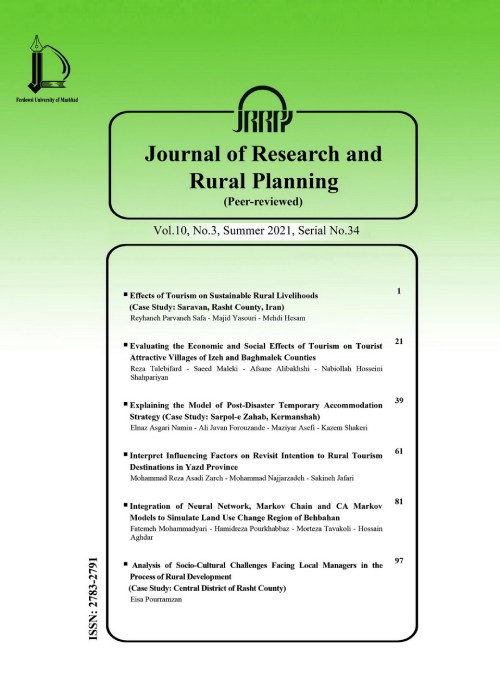The Effect of Strategic Thinking and Social Capital on Recognition of Entrepreneurial Opportunities among Rural Youths (Case Study: Kangavar County)
Author(s):
Abstract:
1.
The main purpose of this study was to determine the effect of strategic thinking and social capital on recognition of entrepreneurial opportunities among rural youth. This study also aims to investigate the demographic characteristics of rural youth, identify the situation of recognition entrepreneurial opportunities and their components, identify social capital components condition, and identify situation of strategic thinking components.
2.
3.
4.
Introduction
So far, different strategies have been proposed for rural development in different periods of time. Based on international experiences and the current conditions in Iran, this country needs to use a new approach to rural development. In this regard, rural entrepreneurship development strategy can be pointed out. There is a growing consensus that entrepreneurship is the process through which new economic activities and organizations come into existence. Keeping this in mind opportunities are central to this process. The literature about entrepreneurial opportunities has grown rapidly since 2000. Considering the earliest stages of development of new economic activities in villages, this marks bring about redirection of entrepreneurship studies. However, theoretical and empirical issues have been limited to important aspects and dimensions of the role of opportunities and their interaction with actors. But, entrepreneurial opportunity emerges from the nexus of individual aspirations with economic and social conditions perceived as favourable to create a new product or service, either in an existing market or a new one. Entrepreneurs discover, evaluate, and exploit opportunities, and rural areas are full of opportunities for rural youths.The main purpose of this study was to determine the effect of strategic thinking and social capital on recognition of entrepreneurial opportunities among rural youth. This study also aims to investigate the demographic characteristics of rural youth, identify the situation of recognition entrepreneurial opportunities and their components, identify social capital components condition, and identify situation of strategic thinking components.
2.
Methodology
In this study, a quantitative method of descriptive-correlation was used. Research area was Kangavar County where four villages (Qazvineh, Dehlor, Fash, and Godin) were selected. Data was gathered through a questionnaire distributed between the rural youths whose age ranged between 20 and 35 (N= 9207). The sample size was determined to be 225 using Bartlett Table. In this study, systematic random sampling was used. Research variables were social capital, strategic thinking and identifying entrepreneurial opportunities. Social capital components consisted of social solidarity, socio-cultural values, social participation, social security, social trust, valuing life, acceptance of differences and social communications. Strategic thinking components were systematic thinking, conceptual thinking, cleverly opportunism and futurity. Moreover, indicators of identifying entrepreneurial opportunities were environmental competitive scanning, seeking pioneer opportunities and innovative strategy of creating opportunity. To measure these variables a five-point Likert scale (1= strongly disagree to 5= strongly agree) was used. In this study, data were analyzed using AMOS and SPSS softwares. The validity of instrument was determined by investigating the views of faculty members of Razi University. And the reliability of the questionnaire has been confirmed using pilot test and Cronbach's coefficient alpha.3.
Discussion
The findings showed that rural youths are weak in terms of identifying entrepreneurial opportunities. Results showed that the model fit is appropriate. The results showed that the social capital of rural youths and strategic thinking was moderate. Among the components of strategic thinking, futurism, and among the components of social capital, social participation had the highest priority among rural youths. Having used Amos software, Model fitting results revealed that, social capital and strategic thinking, respectively, predict and explain 54 and 49 percent of changes of entrepreneurial opportunities recognition. In the research, the final model showed that social capital variables and strategic thinking had positive impact on opportunity recognition. Accordingly, reinforcing components of social capital among rural youths can have a strong relationship with strategic thinking and increase this type of thinking. In general, considering that the characteristics of youth entrepreneurship, (including social capital and strategic thinking) will have an impact on youth entrepreneurship intentions, it is expected that rural youth entrepreneurship intentions and their entrepreneurial skills should be improved. Hence, promoting entrepreneurial characteristics of rural youths is very necessary for them to become entrepreneurs in the future and increase the possibility of influencing their productive employment. Based on the findings, it can be offered that different trainings, such as social skills, management skills, expressiveness skill, persuasion, and social adjustment should be available to the rural youths.4.
Conclusion
The researchers of the present study found that variables such as appreciating the lives of rural youth, futurism, conceptual thinking and opportunism of rural youth had a direct relationship with entrepreneurial opportunities recognition. Rural researchers and planners can use the findings of this study to boost entrepreneurial activities and ventures among the rural youth. These results must, however, be treated with caution because this study is restricted in terms of subject into entrepreneurial opportunities recognition among rural youths of Kangavar County.Keywords:
Language:
Persian
Published:
Journal of Research and Rural Planning, Volume:5 Issue: 2, 2016
Pages:
95 to 110
magiran.com/p1575628
دانلود و مطالعه متن این مقاله با یکی از روشهای زیر امکان پذیر است:
اشتراک شخصی
با عضویت و پرداخت آنلاین حق اشتراک یکساله به مبلغ 1,390,000ريال میتوانید 70 عنوان مطلب دانلود کنید!
اشتراک سازمانی
به کتابخانه دانشگاه یا محل کار خود پیشنهاد کنید تا اشتراک سازمانی این پایگاه را برای دسترسی نامحدود همه کاربران به متن مطالب تهیه نمایند!
توجه!
- حق عضویت دریافتی صرف حمایت از نشریات عضو و نگهداری، تکمیل و توسعه مگیران میشود.
- پرداخت حق اشتراک و دانلود مقالات اجازه بازنشر آن در سایر رسانههای چاپی و دیجیتال را به کاربر نمیدهد.
In order to view content subscription is required
Personal subscription
Subscribe magiran.com for 70 € euros via PayPal and download 70 articles during a year.
Organization subscription
Please contact us to subscribe your university or library for unlimited access!


